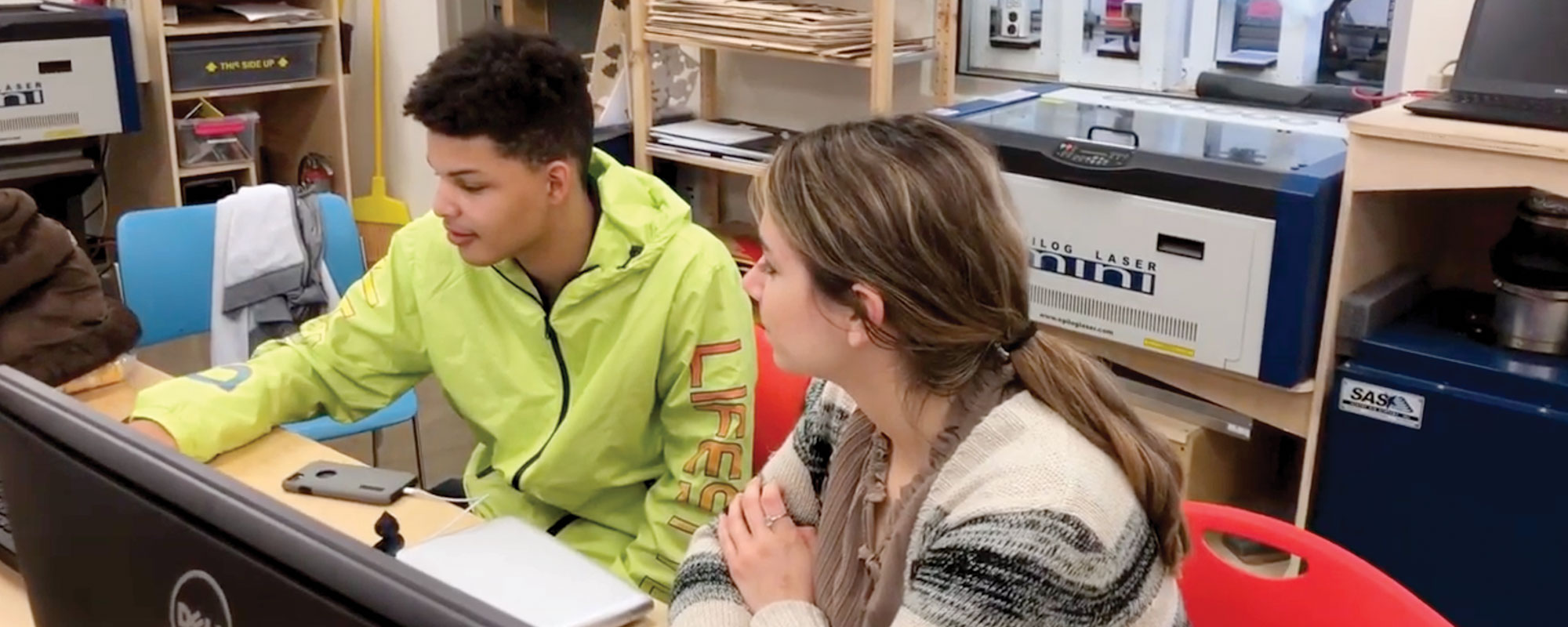You May Also Like
Opening up the World for Others ‘We Do Still Exist, and We’re Thriving.’ Creative ConnectionsWhen the Mentors in the Making program launched in 2017, it began as an expansion of Carnegie Science Center’s BNY Mellon Mobile Fab Lab, which rolls digital design and fabrication experiences into schools. As interest grew, so did the idea. Why not give high schoolers without easy in-school access to digital maker spaces—Pittsburgh Public Schools and charter schools on the North Side included—a deeper, longer-term interaction with technology and adult mentors?
The program has a catch: the mentors, who all come from STEM (science, technology, engineering, and math) fields, have no real knowledge of digital fabrication technologies like 3D printing, electronics, and laser cutting. Which is the point. Mentors in the Making is designed so that the learning is two-directional. Mentor and mentee figure it out together, giving mentees a firsthand look at how adults in STEM fields go about troubleshooting, failing, learning, adapting, and trying again.
“When I started, I had no idea how to do any of this stuff,” admits PPG chemist Amanda Shay, who began mentoring a year and a half ago after receiving an email at work about the program. For the 2019–2020 session, she’s paired with Kayleigh Wilson-Reilly, a sophomore at Nazareth Prep. “Kayleigh knows pretty well that I’m not afraid to say, ‘Nope, I have no idea what the answer is.’ It’s nice; it shows that I might be older and working in a career, but this is different from what I do on a day-to-day basis, so I’m learning with her as I go. I’m more of a peer to her than a superior.”
“Being at the Fab Lab … changed the way I think. Now, when I see woodwork or a computer program, I compare it to the work I’ve done and I usually say, ‘I can do that,’ or ‘I wonder how they made that?’”
– Nazareth Prep student Destany Best
In the final weeks of this year’s spring session, the program shifted to virtual learning in the wake of the pandemic. Normally, pairs meet in person for 2 1/2 hours once a week for 16 weeks after participating in a “get to know you” onboarding session led by The Mentoring Partnership of Southwestern Pennsylvania. Mentors and mentees meet for a total of about 40 hours of instruction, the fusion of an after-school/work program. Students are provided with transportation to and from the Science Center, served dinner alongside their mentors, and given all the necessary materials for the hands-on instruction. At the conclusion of the program, mentees are given a laptop computer so they can continue honing their design skills.
Kayleigh’s favorite project involved learning how to solder. “It had to be very precise and focused,” she says. “You had to shut everything else out. It felt calming. I was proud that I learned a skill most teenagers haven’t learned.”
Now in its third year, the latest Mentors in the Making class has 18 pairs collaborating on four complex design projects while also earning their certification on the CNC machines. Once complete, they shift the focus to a capstone project, which includes a human-centered design element to encourage the creation of something that positively impacts their community.
For Amanda and Kayleigh, their capstone project consisted of designing a large-scale molecular set. “Kayleigh wanted to make it to give to her chemistry teacher, so it would be easier for her to show things in front of the class,” Amanda explains. “It was very sweet and a great idea, the fact that she applied the project to her everyday life and thought of something that would be very relevant for everyone.”
“Helping others is important to our world,” says Kayleigh.
Mentors in the Making had such a meaningful impact on Destany Best, now a senior at Nazareth Prep, that she returned as a teen volunteer for the program. “I love educating and learning about STEM and how it can change the world,” she says. Following graduation, she plans on attending a liberal arts college with the goal of owning a biodigestion company that will turn human and food waste into clean, renewable energy.
“Being at the Fab Lab constantly sparked my interest in mechatronics, mechanical engineering, soldering, and becoming a maker. … It changed the way I think,” says Destany. “Now, when I see woodwork or a computer program, I compare it to the work I’ve done and I usually say, ‘I can do that,’ or ‘I wonder how they made that?’ All in all, participating in the program definitely changed my life and my future for the better.”
That transformation does not stop with the students. For professionals like Amanda, seeing their mentees morph from introverts to actively engaging in conversation with adults and mastering new technologies that they had no prior knowledge of was inspiring.
“It’s pretty rewarding to watch them grow,” she says.
Mentors in the Making is made possible thanks to support from The Grable Foundation and Cognizant’s Making the Future program.
Receive more stories in your email
Sign up
